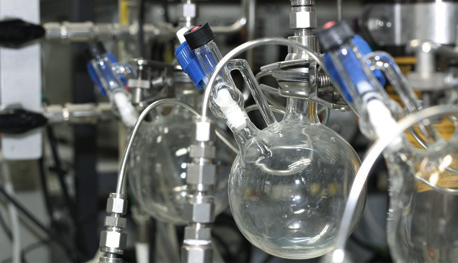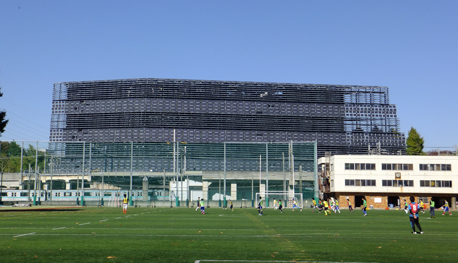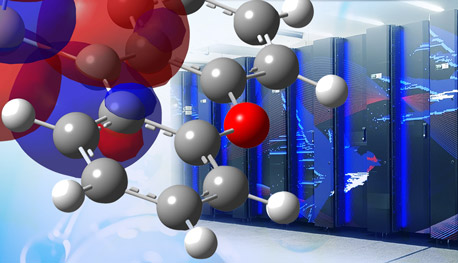Education
Chemistry Undergraduate MajorCurriculum
Broad, foundational learning
dovetailed with a solid grasp of substances and practical skills
Students in their first year receive a thorough grounding in basic sciences such as mathematics, physics, and chemistry. When students advance to their second year and begin their Chemistry Major, they acquire foundational knowledge in the areas of physical chemistry, inorganic and analytical chemistry, and organic chemistry through required courses. They then go on to build a systematic and extensive knowledge of the discipline by taking electives in these areas as well as in subjects that are foundational to the study of chemistry such as chemical safety. Compulsory laboratory courses deepen students' empirical understanding of chemistry and the substances it covers, as well as help them to develop practical, applied skills. In addition, by conducting their own research in the Independent Research Project, students are able to develop their creative skills and further deepen their understanding and applied skills.
-
1st Year
- 100-Level Courses
-
Students in their first year of undergraduate studies receive basic education that centers on Institute-wide compulsory courses regardless of their discipline. The 100-level courses are designed to teach common, basic skills that are required of science and technology students. The aims of these courses are to provide knowledge and cultivate versatile intellect necessary for studying at the Institute.
-
2nd Year
3rd Year- 200-Level and 300-Level Courses
-
Students who complete their 100-level courses advance to study their undergraduate major. Courses at the 200- and 300-levels specific to the Chemistry Major are taken in accordance with the curriculum.
-
- Physical Chemistry Courses
- Students cover the basics in quantum chemistry, chemical and statistical thermodynamics, and chemical kinetics through lectures and exercises. Following that, they systematically study advanced, specialized topics of physical chemistry.
-
- Inorganic and Analytical Chemistry Courses
- Students cover the basics in structures, properties, and synthetic methods of inorganic compounds as well as in analytical chemistry through lectures and exercises. Following that, they systematically study advanced, specialized topics of inorganic and analytical chemistry.
-
- Organic Chemistry Courses
- Students cover the basics in structures, properties, and synthetic methods of organic compounds through lectures and exercises. Following that, they systematically study advanced, specialized topics of organic chemistry.
-
- Common Chemistry Courses
- Through lectures and exercises, students take subjects such as mathematics and safety training that are necessary for the study of chemistry.
-
- Laboratory Courses
- In order to develop a solid understanding of substances, it is important for students to gain plenty of practical experience in synthesizing and analyzing them. Through work done in laboratories, students learn experimental techniques required in foundational as well as specialized areas of chemistry, and furthermore acquire practical, applied skills.
-
-
4th Year
- 200-Level and 300-Level Courses
-
At the final stage of the 300-level is the Independent Research Project (equivalent to the Undergraduate Thesis Research that was in place previously). The project is intended to serve as a capstone for students to consolidate and reinforce all of the skills acquired in their Chemistry Major. Furthermore, they may choose to enroll in the Advanced Independent Research Project. The purpose of this course is to enhance student interest in scientific and technological research that began with the Independent Research Project. The course provides students with the opportunity to actively engage in their interests by taking part in science- and technology-related activities.
* The timeline depicts a standard case where students complete their bachelor's degree program in four years.
-
Entrance Examination
Students need to pass an entrance exam to advance from a bachelor's to master's program. To advance from a master's to a doctoral program, students must pass an advancement assessment.
-
Graduate Majors
Master's Program
Doctoral Program- 400-Level, 500-Level, and 600-Level Courses
-
Students who have completed the undergraduate major in chemistry may continue to study the same field in greater depth at the graduate major level. They may also pursue a closely related interdisciplinary graduate major called Energy Science and Informatics. There is also closely related interdisciplinary graduate major, Materials and Information Sciences.
-
- Department that offers this graduate major
-
- Chemistry
-
- Departments that offer this graduate major
-
- Department that offers this graduate major
-



